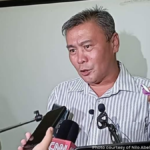Governor Aris Aumentado has ordered the implementation of tight security measures to prevent the movement of hogs and pork products from a village in Pilar where suspected cases of the dreaded African swine fever (ASF) have been reported.
According to Aumentdao, police and military personnel have been deployed to Pilar to help cordon off the area while the Office of the Provincial Veterinary (OVP) has collected blood samples from dead hogs suspected of having contracted the disease in the remote barangay of San Vicente.
“Ato ng gipasusi kung confirmed na gyud na ASF pero so far, dili pa diay mo, pero at least na cordon na nato aron dili makagawas ang mga baboy anang mga area aron dili maka contaminate,” said Aumentado on Tuesday.
Since 2019, Bohol has been on alert against ASF in a bid to keep the province’s P6-billion hog industry safe from the highly contagious and deadly hog-borne disease.
Local tests have confirmed that the dead hogs contracted a viral disease but results of confirmatory tests conducted by the Bureau of Animal Industry (BAI) that would determine if they were infected with ASF were still awaited.
Aumentado said the results were expected to arrive within the day.
The initial protocol set by the OVP was to collect blood samples within a 100-meter radius of the area where the suspected cases were detected but Aumentado increased it to 500 meters.
“Ako silang giingnan na mo atras ta og 500 meter radius pero at least lajo lajo na unya ana ta magsugod padulong sa sulod,” he said.
According to Mayor William Pajo of Pilar, 10 hogs have died since July 19 after showing signs of infection while 20 more which tested positive of a viral infection were culled by the OVP.
Based on the Pilar local government’s initial probe, a family which brought hogs from Manila may have caused the spread of the viral disease in the village.
Pajo said the family’s hogs started dying a week after their arrival from Manila.
The local chief executive added that hog raisers affected by the spread of the disease will receive financial assistance from the government. (A. Doydora)



